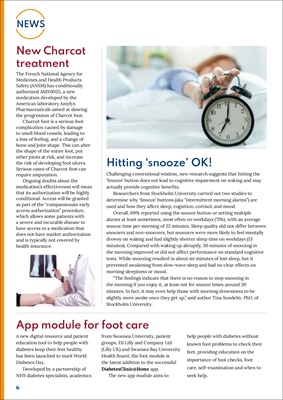
6
NEWS
Hitting 'snooze' OK!
Challenging conventional wisdom, new research suggests that hitting the
'Snooze' button does not lead to cognitive impairment on waking and may
actually provide cognitive benefits.
Researchers from Stockholm University carried out two studies to
determine why 'Snooze' buttons (aka "intermittent morning alarms") are
used and how they affect sleep, cognition, cortisol, and mood.
Overall, 69% reported using the snooze button or setting multiple
alarms at least sometimes, most often on workdays (71%), with an average
snooze time per morning of 22 minutes. Sleep quality did not differ between
snoozers and non-snoozers, but snoozers were more likely to feel mentally
drowsy on waking and had slightly shorter sleep time on workdays (13
minutes). Compared with waking up abruptly, 30 minutes of snoozing in
the morning improved or did not affect performance on standard cognitive
tests. While snoozing resulted in about six minutes of lost sleep, but it
prevented awakening from slow-wave sleep and had no clear effects on
morning sleepiness or mood.
"The findings indicate that there is no reason to stop snoozing in
the morning if you enjoy it, at least not for snooze times around 30
minutes. In fact, it may even help those with morning drowsiness to be
slightly more awake once they get up," said author Tina Sundelin, PhD, of
Stockholm University.
New Charcot
treatment
The French National Agency for
Medicines and Health Products
Safety (ANSM) has conditionally
authorized AMX0035, a new
medication developed by the
American laboratory Amylyx
Pharmaceuticals aimed at slowing
the progression of Charcot foot.
Charcot foot is a serious foot
complication caused by damage
to small blood vessels, leading to
a loss of feeling, and a change of
bone and joint shape. This can alter
the shape of the entire foot, put
other joints at risk, and increase
the risk of developing foot ulcers.
Serious cases of Charcot foot can
require amputation.
Ongoing doubts about the
medication's effectiveness will mean
that its authorization will be highly
conditional. Access will be granted
as part of the "compassionate early
access authorization" procedure,
which allows some patients with
a severe and incurable disease to
have access to a medication that
does not have market authorization
and is typically not covered by
health insurance.
App module for foot care
A new digital resource and patient
education tool to help people with
diabetes keep their feet healthy
has been launched to mark World
Diabetes Day.
Developed by a partnership of
NHS diabetes specialists, academics
from Swansea University, patient
groups, Eli Lilly and Company Ltd
(Lilly UK) and Swansea Bay University
Health Board, the foot module is
the latest addition to the successful
DiabetesClinic@Home app.
The new app module aims to
help people with diabetes without
known foot problems to check their
feet, providing education on the
importance of foot checks, foot
care, self-examination and when to
seek help.